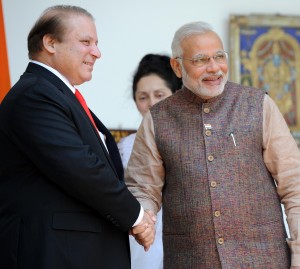 Stressing that space technology is for the common man and not just for the elite, Prime Minister Narendra Modi Monday urged Indian space scientists to develop a satellite for the South Asian Association for Regional Cooperation (SAARC) nations.
Stressing that space technology is for the common man and not just for the elite, Prime Minister Narendra Modi Monday urged Indian space scientists to develop a satellite for the South Asian Association for Regional Cooperation (SAARC) nations.
Speaking here after witnessing the successful launch of five foreign satellites by an Indian rocket – Polar Satellite Launch Vehicle (PSLV)- Modi said: “I believe technology is fundamentally connected to common man. It can transform his life.”
He described it as “global endorsement of India’s space capability” inspired by Atal Bihari Vajpayee’s vision. “We have sent a mission to Moon and another is on its way to Mars.”
“I feel specially privileged to witness this event in person,” said Modi, who applauded as the rocket standing 44.4 metres tall and weighing around 230 tonnes tore into the bright morning skies with orange flames fiercely burning at its tail.
The rocket’s main luggage was the 714-kg French earth observation satellite SPOT-7.
Piggybacking with it were the four small satellites viz: 14-kg AISAT of Germany; NLS7.1 (CAN-X4) and NLS7.2 (CAN-X5) from Canada each weighing 15 kg; and the 7-kg VELOX-1 of Singapore.
Modi said this is a “global endorsement of India’s space capability”.
He urged the Indian space scientists to develop a SAARC satellite that would offer a full range of services that can be used by the neighbouring countries.
Modi also urged the Indian Space Research Organisation (ISRO) to expand the footprint of its navigation systems to all of South Asia.
He said the Indian navigation system will be in place by 2015.
India should develop more advanced satellites and develop capabilities to launch heavier satellites, Modi said.
He said the benefits of space technology should be shared with those who do not have the same and cited the provision of telemedicine technology to Afghanistan and Africa.
Modi in his 25-minute speech said the continued progress should be the national mission and asked ISRO to engage with all the stakeholders to maximize the use of space science in governance and development.
According to him, the space technology is an invaluable asset in disaster management with its advanced warning systems.
He said GIS (Geographic Information Systems) has transformed policy planning, implementation while space imaging enables management of resources.
Praising the Indian space scientists for the successful rocket launch, Modi said they have shown the world the power of frugal engineering and imagination.
He said the cost of India’s mission to Mars is lower than the cost of Hollywood movie “Gravity”.
Modi said he is following the progress of the Mars mission keenly.